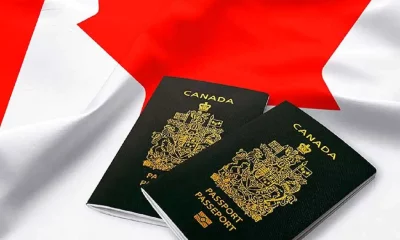Career
Types of Work Visas to Migrate to USA
The United States is a prime destination for individuals seeking employment opportunities from around the world. However, to legally work in the U.S., foreign nationals must obtain the appropriate work visa. The U.S. offers various work visa categories, each designed for specific employment situations. We will explore the different types of work visas available, their eligibility criteria, the application process, and other essential details.
1. Temporary (Non-Immigrant) Work Visas
Temporary work visas allow foreign nationals to work in the U.S. for a specified period. These visas are usually tied to a specific employer, and the worker must leave the country once the visa expires unless they obtain an extension or a new visa.
H-1B Visa (Specialty Occupations)
The H-1B visa is one of the most sought-after work visas in the U.S. It is designed for professionals in specialized fields such as IT, engineering, finance, healthcare, and education.
- Eligibility: Requires a bachelor’s degree or higher in a specialized field.
- Duration: Initially granted for up to three years, with an extension available for up to six years.
- Annual Cap: Limited to 65,000 visas per year, with an additional 20,000 for those holding a master’s degree from a U.S. institution.
H-2A Visa (Temporary Agricultural Workers)
The H-2A visa is for seasonal agricultural workers.
- Eligibility: Employers must demonstrate that there are not enough U.S. workers available for the job.
- Duration: Typically lasts for the agricultural season, up to one year, with extensions possible.
H-2B Visa (Temporary Non-Agricultural Workers)
The H-2B visa is for seasonal non-agricultural jobs such as hospitality, landscaping, and construction.
- Eligibility: Employers must show a temporary need and prove a lack of U.S. workers for the role.
- Duration: Usually valid for up to one year, with extensions possible for a total of three years.
L-1 Visa (Intra-Company Transfers)
The L-1 visa is for employees of multinational companies transferring to a U.S. office.
- Eligibility: Requires at least one year of employment with the foreign company in the past three years.
- Duration: L-1A (for managers and executives) allows up to seven years; L-1B (for specialized knowledge employees) allows up to five years.
O-1 Visa (Individuals with Extraordinary Ability)
The O-1 visa is for individuals with extraordinary ability in sciences, arts, education, business, or athletics.
- Eligibility: Must provide substantial evidence of extraordinary achievements.
- Duration: Initially granted for up to three years, with one-year extensions available.
TN Visa (For Canadian and Mexican Citizens)
The TN visa is part of the United States-Mexico-Canada Agreement (USMCA) and allows professionals from Canada and Mexico to work in the U.S.
- Eligibility: Requires a job offer in an approved profession.
- Duration: Granted for up to three years, with unlimited renewals.
2. Permanent (Immigrant) Work Visas
Permanent work visas, also known as employment-based green cards, allow foreign nationals to live and work permanently in the U.S.
EB-1 Visa (Priority Workers)
The EB-1 visa is for individuals with extraordinary ability, outstanding professors and researchers, and multinational executives.
- Eligibility: Requires proof of exceptional achievements or an executive position in a multinational company.
- Green Card Pathway: Provides direct access to permanent residency.
EB-2 Visa (Advanced Degree Professionals)
The EB-2 visa is for individuals with advanced degrees or exceptional ability in their field.
- Eligibility: Must hold a master’s degree or higher or show exceptional ability.
- Green Card Pathway: Requires a labor certification unless applying for a National Interest Waiver (NIW).
EB-3 Visa (Skilled Workers, Professionals, and Unskilled Workers)
The EB-3 visa covers a broader range of workers, including skilled, professional, and unskilled laborers.
- Eligibility: Requires a job offer and labor certification.
- Green Card Pathway: Can lead to permanent residency but has longer wait times than EB-1 and EB-2.
EB-4 Visa (Special Immigrants)
The EB-4 visa is for religious workers, broadcasters, and other special categories.
- Eligibility: Varies based on category; religious workers must be employed by a nonprofit religious organization.
- Green Card Pathway: Allows direct application for permanent residency.
EB-5 Visa (Investor Visa)
The EB-5 visa is for individuals investing in the U.S. economy.
- Eligibility: Requires an investment of at least $800,000 in a qualifying project that creates at least ten jobs.
- Green Card Pathway: Investors and their families can obtain permanent residency.
How to Apply for a U.S. Work Visa
The application process varies depending on the visa type but generally includes these steps:
- Employer Sponsorship: Most work visas require an employer to sponsor the applicant.
- Petition Filing: The employer files Form I-129 (for non-immigrant visas) or Form I-140 (for immigrant visas) with U.S. Citizenship and Immigration Services (USCIS).
- Visa Application: Once approved, the applicant submits Form DS-160 (for temporary visas) or DS-260 (for immigrant visas) and schedules a visa interview at a U.S. embassy.
- Visa Interview: The applicant attends an interview and provides the required documents.
- Visa Issuance: If approved, the visa is stamped in the applicant’s passport.
Common Challenges and Considerations
- Visa Lottery for H-1B: Due to high demand, H-1B applicants must go through a lottery system.
- Labor Certification: Some visas require a labor certification process, which can be time-consuming.
- Processing Times: Work visa processing times vary based on demand and location.
- Dependents: Many work visas allow spouses and children to accompany the primary visa holder.
Conclusion
Understanding U.S. work visas is crucial for anyone looking to pursue employment opportunities in the United States. Whether seeking a temporary job or permanent residency, choosing the right visa category and following the correct application procedures can significantly impact your success. If you’re considering working in the U.S., consult an immigration attorney or professional to navigate the complexities of the visa process effectively.
















